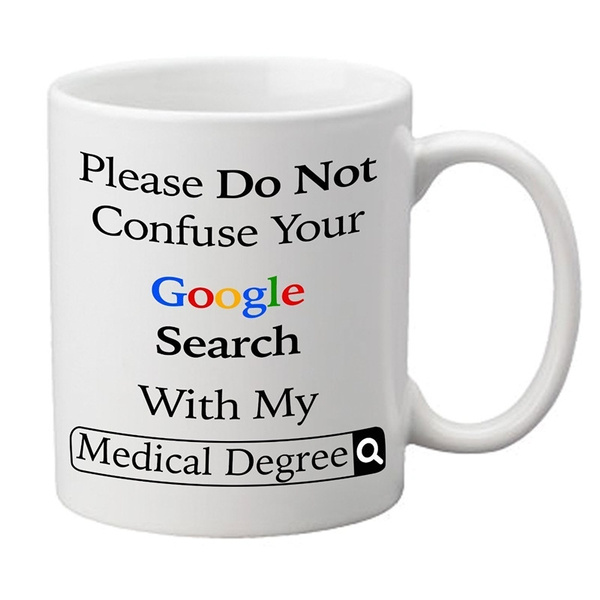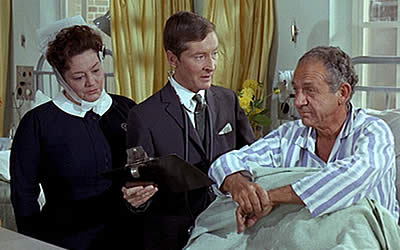Google versus doctors
I came across yet another of these complaints yesterday from a doctor in the brain tumor discussion group on Twitter.
I won’t embarrass the doctor who posted it but every time I see one of these tweets I shudder a little and thank the heavens that they are not my doctor.
Look, I help to run an online community for patients so I am well acquainted with the people who google “My toe hurts” and end up thinking they have a sarcoma. Smart Patients also gets its share of covid conspiracy theorists who think that the vaccine was all a plot concocted by Bill Gates and the Deep State because of some looney video that they saw on InfoWars. At times, during the pandemic, the kooks and the conspiracists threatened to overrun our ramparts but we survived.
But most people who google their condition are not like those people. When you dismiss my concerns out of hand, you remind me of a certain old-fashioned kind of doctor.
Do doctors learn Aristotle’s Doctrine of the Mean in medical school? Or are they just trained to dismiss patient concerns because the doctor always knows best? Surely there is a middle ground between these two extremes.
e-Patient Dave says it best:
It’s absolutely, demonstrably wrong for a doctor to think that doctors know everything that needs to be known and patients can’t possibly know anything useful. To the contrary, not googling can bring death.
e-Patient Dave at the Society for Participatory Medicine
Most people, when they are first diagnosed with a serious condition, are ignorant, confused and afraid but most learn quickly that there is knowledge in online communities that doctors don’t have access too. Our role as patients is not to find all the answers; it’s to learn enough to ask the right questions. An online community where you can meet other patients who have walked the path that you are on can help you ask the right questions.
Let me share some examples. Before my first meeting with my neurosurgeon after my glioma diagnosis, I googled a bit.
I learned that the standard of care for a low-grade glioma was 1) surgery to remove the tumour then 2) a biopsy and, depending on the molecular profile of the of the tumour, 3) radiation followed by 4) chemotherapy. I also knew that the type and effectiveness of the chemotherapy would be determined by the presence of certain mutations and biomarkers. For example, PCV is more effective if you have the 1p19q codeletion while TMZ is easier to tolerate for most patients.
The neurosurgeon recommended that we start with a craniotomy and resection (surgery to remove the tumour) and a biopsy of the tumour would inform what to do next. I asked about the likely deficits from surgery. I’m rather fond of my brain and I would rather not damage it if possible. According to this study, 41% of craniotomies result in neurological deficits such as the inability to speak or walk after surgery, palsy and weakness in the arms. Most (but not all) deficits recover within 3 months of surgery.
I asked if it were possible to biopsy the tumour without a craniotomy. The neurosurgeon said that a needle biopsy was possible but they were very unreliable because of the heterogeneous nature of low-grade gliomas (different parts of the tumour might have different mutations). He said it would be better to do the resection first and biopsy the full tumour.
I asked about the possibility of chemo and he said it was way too early to talk about chemo and, anyway, the chemo for brain tumours is nothing like what I probably imagined. He also made a kind of wave to emphasize that my question was stupid. I googled to find an accurate representation of his wave of dismissal. It was just like this.
I asked about getting a second opinion but my nurse told me that it’s unlikely that an oncologist would agree to see me without a biopsy.
By the time of our second consultation, I had read just about every paper on Pubmed about low-grade gliomas (LGGs). I learned a lot about how the Extent Of Resection (EOR — how much of the tumour is removed by surgery) has a big impact on expected survival times. 100% EOR is ideal and survival drops off quite rapidly when you get down to 80% EOR. At some point, you have to wonder if the pain and problems of a craniotomy are worth the extra few months that surgery buys you. At least, I wondered about it and I asked my neurosurgeon.
Me: Can you guess at the expected extent of resection from the MRI?
NS: Hmmm… 20%…50% maybe…
Me: Then why are we talking about resection at all?
I asked again for a second opinion and my nurse set me up with the lovely Dr XX. She agreed with me (and Dr Google!) that surgery with 20%-50% resection did not sound like a very good deal. She agreed with me (and Dr Google!) that radiation was probably not possible. She also agreed with me (and Dr Google!) that a needle biopsy was a good next step. The tumour board agreed too.
I’ll share one more example of doctor vs google and then I’ll rant a bit about why things are the way they are.
I was surprised when my neurosurgeon told me that my smell hallucinations were actually a kind of epileptic seizure. I googled.
Epilepsy is a clinical diagnosis. As with any other seizure, it is most important to make sure that the episode is truly a seizure.
…
Before deciding on treatment, a doctor will need to confirm that a person is having complex partial seizures. The doctor will need as many details as possible from the person having the seizures as well as from someone who has seen these episodes on a number of occasions. The doctor will need to know what happens before, during, and after each episode.
…
If a doctor suspects a complex partial seizure, they will usually order a diagnostic test to confirm.
https://www.ncbi.nlm.nih.gov/books/NBK519030/
Everything I read online about complex partial seizures says that seizures are transient: they have a beginning and an end.
A seizure happens when electrical activity in the brain surges suddenly. The brain and body are affected in different ways depending on where the activity occurs. Epilepsy is a condition that is linked to seizures.
Complex partial seizures (CPS) are the most common type of epilepsy in adults. These seizures can last between 30 seconds and 2 minutes.
https://www.cedars-sinai.org/health-library/diseases-and-conditions/c/complex-partial-seizures.html
The main symptom of epilepsy is repeated seizures. These are sudden bursts of electrical activity in the brain that temporarily affect how it works.
https://www.nhs.uk/conditions/epilepsy/symptoms/
I asked my neurosurgeon if it was possible that my phantom smells were not actually seizures since they are not transient. They last from the moment I wake up in the morning to the moment I go to sleep at night. He did that wave thing again and said we can increase the dose of my anti-seizure medication to make them go away.
I told my lovely specialist nurse that the anti-seizure medication is now giving me unpleasant side effects and that I still doubted that my seizures were seizures. She emphasized that the neurosurgeon says they are seizures. Mrs Clown asked if it’s possible to confirm that they are seizures by EEG. The Lovely Nurse said they don’t usually do that because it’s quite common for gliomas to cause seizures but she did refer me to a nurse who was a specialist in epilepsy.
The epilepsy nurse said that the information I read online was wrong because the doctor said I was having seizures. She prescribed another anti-seizure medication. I imagined her doing a little wave over the phone.
Now I am taking two medications to prevent seizures that I don’t think I am having. I don’t really care about the seizures — there are worse things than phantom smells — and maybe they really are seizures. Maybe these medications will save me from The Very Big Seizure that will bring my story to an end but, if we are using the presence of seizures-that-might-not-be-seizures to determine whether the medication is working, surely it’s worth figuring out whether or not they actually are seizures first.
I mentioned this to Dr XX and she said “Hmmm. They don’t sound like seizures to me either. Let me refer you to the Chief of Epilepsy who specialises in brain tumour-related seizures. He’ll figure it out”. Anyway, here we are a few weeks later and I have not yet been referred to the Chief. Mrs Clown called to follow up and the Lovely Nurse referred us back to the epilepsy nurse. I already know what she will say. I wrote it on a piece of paper. After she calls, I’ll tell you if I got it right.
I’m a little bit shocked that things are the way they are. Treatment for brain tumours has barely changed in almost fifty years. There’s no evidence that resection helps with diffuse low-grade tumours like the one I have but the standard of care says to do the resection anyway. The chemo for certain LGGs is PCV. The V stands for vincristine. A bit of googling says there is mixed evidence about whether vincristine crosses the blood-brain barrier and whether it has any effect on gliomas. As far as I can tell, oncologists give vincristine because they have always given vincristine. No one ever thought, until now, to test whether it does any good.
However, the various and severe toxicities of this treatment, including hematologic toxicity from lomustine and peripheral neurotoxicity from vincristine, often result in its reduction or discontinuation in glioma patients. In addition to its toxicity, vincristine is composed of relatively heavy molecules (825 Daltons), and concerns exist about its successful crossing of the blood-brain barrier.
Clinical feasibility of modified procarbazine and lomustine chemotherapy without vincristine as a salvage treatment for recurrent adult glioma
Maybe a little bit of googling would help fill in the gaps of a medical degree after all. As a patient, I don’t want to tell you how to do your job but I would like you to listen to my concerns and answer my questions. If I’m wrong about something, I won’t be offended if you tell me I am wrong. I’ll be annoyed if you just wave me away though.
Prequel
I’m the kind of person who does not go to the doctor unless I am sure that
- The condition is serious.
- I think the doctor can do something about it.
I explained this to the doctor who treated me for back pain when I could barely walk. She said she had no idea what caused my pain but she prescribed me some horrible medication.
“Will it do any good?” I asked.
“**shrug**” she said.
I didn’t take the medication.
Among the things that I thought were serious enough to see my doctor in California about are a grand-mal seizure, violent, vomit-inducing vertigo, restless leg syndrome, and a sex headache (google it — they are quite unpleasant). Maybe it’s just a coincidence that I had five serious neurological symptoms just before my diagnosis of a brain tumour but my doctor told me to stop googling things so we’ll never know.
Here’s Dave again.
It’s absolutely, demonstrably wrong for a doctor to think that doctors know everything that needs to be known and patients can’t possibly know anything useful. To the contrary, not googling can bring death.
e-Patient Dave at the Society for Participatory Medicine






